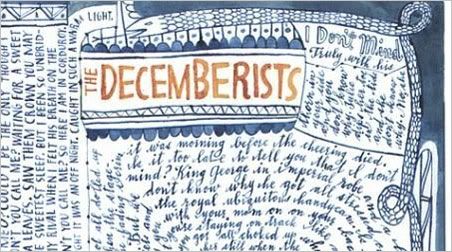WEEKEND THROWBACK

“I Don’t Mind”
from the EP 5 Songs
2001
iTunes
May 23, 2003:
Strange how sometimes you can’t fully appreciate a band until you hear their lesser material. It’s easy to take the most well-executed, naturally powerful elements of a band’s sound for granted never having heard the early, less-refined work they’ve grown from. Such is the case with 5 Songs, a reissue of the Decemberists’ self-released first EP, which features an additional, title-nullifying sixth track. The same crystal-clear, folk-informed sound that spun throughout the Portland band’s beautiful full-length Castaways & Cutouts is at the core of 5 Songs, but singer Colin Meloy’s potent, imaginative whimsy is passed up in favor of a more straightforward pop sensibility that’s ultimately less rewarding.
Much has been made of the similarities between Castaways & Cutouts and Neutral Milk Hotel’s opus In the Aeroplane Over the Sea. The two albums do have a lot in common — the similar vocal inflections of Meloy and Mangum and the intersecting themes of their material — but Meloy’s songs address mythical pasts with a certain degree of dream-like detachment, conjuring and retelling vivid images and tales while never participating directly. Mangum, on the other hand, is a man possessed: he lives his stories, and describes them with a wrenching directness.
Meloy’s subtle, observational tone seems like a moot point on 5 Songs, which never tackles the same kind of involved, quasi-historical narratives of Castaways. Not only is the EP thematically indistinct, the hazy red pastel clouds and ghostly, disembodied figures of Castaways are replaced with sharp, distinct outlines. Generally speaking, 5 Songs is a much more steady and controlled batch of songs, with none of the unsettling undertones of its winding successor.
5 Songs does convey a subtle sense of melancholy, through laid-back melodies and evocative instrumentation. The opener “Oceanside” is definitely one of the best offerings here, a backdrop of acoustic guitars and accordion painting a vivid picture of some lonely foreign port, perfectly framing Meloy’s longing, nautical lyrics. The more uptempo “Shiny” fails to develop a particularly moving refrain, relying too heavily upon bits of slide guitar worked into a disappointingly formless structure.
“Angel, Won’t You Call” almost delivers on the sparse broken promise of “Shiny,” building to a powerful chorus, but it stops just short. The appended “Apology Song” is simply out of place, with lame, awkward couplets like “I’m really sorry Steven / But your bicycle’s been stolen.” Meloy is much more adept describing the regret of a soldier at Burkenau than that of some dude who lost his friend’s bike; it’s hard to take “Apology Song” as anything more than a hokey inside joke, and that can almost cheapen the resonance of his more potent latter-day lyrics.
Though 5 Songs is by no means a bad release, its relative lack of substance when compared to Castaways is close to staggering; it makes the latter both a relief and a revelation, as the powerful songwriting hinted at here is fully realized. But it’s easy to see how Castaways is an evolution from 5 Songs, which suggests that claims of theft or simple imitation hurled at Meloy are somewhat exaggerated, if not outright unfounded.



please don't re-post things from Pitchfork. They don't like music.